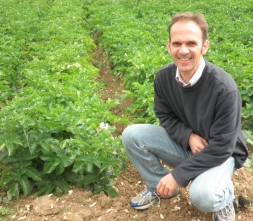Scientists sequence potato genome

Researchers from Imperial College London and international colleagues have decoded the genome of the potato - News
Adapted from a news release issued by BBSRC
11 July 2011
The genome of the potato has been sequenced in a collaborative international study involving scientists from Imperial College London. The research, published today in the journal Nature, is the first to sequence the genome of a major UK crop plant.
Spud facts:
- Originally brought from Peru by Spanish explorers, the potato arrived in Europe in 1536
- Potatoes were grown for the first time in London in 1597
- The UK now consumes 94kg of potatoes per person per year
- Thousands of varieties of potato are now grown around the world, with 450 in the UK alone
- It currently takes 10-12 years to breed a new variety of potato
- The first French Fries were served in America in 1801
- In 1952 a popular toy called 'Mr Potato Head' was invented
- The first potato was grown in space in 1995 on the space shuttle Columbia
- (Source: The Potato Council)
This new information about the potato's genetic makeup will speed up the traditionally time-consuming process of developing new varieties. Scientists are convinced that this will improve the quantity and quality of potatoes, as well as their nutritional value and resistance to pests and diseases.
In addition, the genome sequence will allow scientists and breeders to increase the efficiency of potato production. This will be particularly important for developing countries, where potato consumption is expanding, and which now produce more than half of the global potato harvest. The ease of cultivating potatoes and their high energy content have made them a valuable cash crop for millions of farmers in these areas.
Commenting on the publication of the potato genome, Jim Paice, the UK's Minister for Agriculture, said "This is a great achievement by British scientists and is fantastic news for our farmers. If we're to feed the nine billion people projected to be living on the planet by 2050 then potato crops with improved water uptake and resistance to disease and drought will be an important development."
Research co-author Dr Gerard Bishop, from Imperial's Department of Life Sciences, said "The wider crop research community has been eagerly anticipating this news; the potato genome will also help our understanding of closely related crops such as tomato, which will be of enormous benefit.

Dr Gerard Bishop poses in a field of potato plants in the UK
"Potato is a member of the Solanaceae family, which also includes tomato, capsicum (the peppers we all buy in the supermarket), and aubergine. As a food it is becoming more and more popular, and is increasingly important in Africa and many parts of Asia, giving it a vital role in global food security."
Dr Glenn Bryan from The James Hutton Institute, who led the UK team, said "This genome sequence is a major step forward in understanding potato biology. It will lead to accelerated breeding of new potato varieties through use of the genome data to identify genes and genetic markers for important traits".
See also:
Related news stories:
"Use of genetics-based selection methods is very promising and technology to exploit the genome sequence immediately is already being prepared in the UK and elsewhere. In addition, an understanding of the genetic blueprint for potato gives us the option of introducing - through breeding programmes - desirable characteristics into existing varieties, such as enhanced pest and disease resistance and improved tuber quality characteristics."
Professor Douglas Kell, Chief Executive, BBSRC said "This is wonderful news - the potato genome will enable scientists to do research now to underpin the developments we will come to rely on in 30-40 years time.
"We must use modern research strategies as well as investigating technologies such as marker assisted breeding and genetic modification so that we can know what is required to ensure sustainable increases in crop yields.
"Genome sequencing is one of most important strategies we have at our disposal and with recent progress in data storage and accessibility it will be possible for plant breeders to identify the best genetic sequences to target and so accelerate breeding programmes."
The UK component of the Potato Genome Sequencing Consortium (PGSC) is led by The James Hutton Institute in Scotland with the University of Dundee and Imperial. Funding for the UK-based research is from the Biotechnology and Biological Sciences Research Council (BBSRC), The Department for Environment Food and Rural Affairs (Defra), The Potato Council, and the Scottish Government.
Article text (excluding photos or graphics) © Imperial College London.
Photos and graphics subject to third party copyright used with permission or © Imperial College London.
Reporter
Press Office
Communications and Public Affairs
- Email: press.office@imperial.ac.uk
